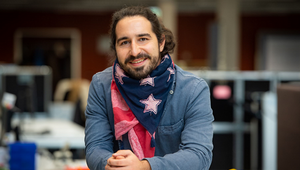Richard Küng was presented with a START Award in the summer, and now the European Union has presented him with an ERC Starting Grant.

Endowed with €1.5 million, the process to receive an ERC Starting Grant is highly competitive, and only approximately 15% of the close to 2,700 submissions were approved this year. Although Richard Küng will have to forfeit the lesser endowed START Award (awarded to only approximately 5% of those who apply) on account of receiving the Starting Grant approval, he is delighted to have received the award. Assoz. Univ. Prof. Küng (Institute for Integrated Circuits) commented: "The grant is very important to me as it signifies that the JKU is not only capable of competing in the European research field, we can also significantly contribute to this research field."
JKU Rector Meinhard Lukas congratulated Prof. Küng and remarked: "As one of the highest awards a junior researcher can receive, ERC Starting Grants not only provide funding to support outstanding scholars and their research, they also indicate a university’s level of excellence. Prof. Küng is just the second JKU researcher to have been awarded both the START Award and an ERC Starting Grant. I would like to take this opportunity to congratulate Richard Küng and I wish him continued success!"
Funding "Quantum-Classical Interfaces"
The road to revolutionary quantum computers is fraught with stumbling blocks. For example, in order to control the experiments and process the results, large-scale quantum experiments require significant computational resources from conventional computers. Expending these resources interferes with the ability to transfer information between the quantum and conventional systems. In turn, it interferes with the use of existing computer architectures and may even impact the ability to scale system sizes.
Assoz. Univ.-Prof. Richard Küng's proposed project employs a unified approach, taking all of the resources in computer technology (quantum and conventional computers) into account. In an effort to solve the information transfer constraints, Küng and his team have devised scalable methods designed to convert quantum information into conventional information.
Called "q-shadows", these interfaces use randomized, quantum-enhanced readout strategies to acquire a precise, conventionally-based description of the underlying quantum system. At the same time, this description can efficiently predict many of the quantum system’s features. The key is using next-generation quantum hardware that can describe real quantum effects. Küng explained: "We are also bridging the gap between quantum-based experiments and (conventional) artificial intelligence."
The interdisciplinary study successfully combines modern, conventional computer science methods with quantum information. Küng's work has already produced many groundbreaking advances, including a publication in "Nature Physics" that has been cited over 650 times, and two publications in "Science".
Küng added: "The study’s findings will not only help push the potential of quantum computing, but also drive the development more efficient and reliable quantum computers forward. The study will open the door to new perspectives regarding applied applications in areas that include simulation, optimization, and artificial intelligence."
About Richard Küng
Born in 1988, Richard Küng studied physics at the ETH Zurich, earning his PhD summa cum laude with his dissertation at the University of Cologne in Germany (2016) with his work titled "Convex Reconstruction from Structured Measurements". He conducted research at Caltech (California Institute of Technology in Pasadena, California, USA) for 3 years before becoming a professor of quantum computing at the JKU in 2020. The Linz native spent 13 years abroad in a professional capacity and has been presented with numerous awards and accolades, including the ETH Zürich’s Willi Studer Prize (2013), the state of Upper Austria’s Talent Promotion Award (2017), the 2022 Cardinal Innitzer Prize, and the 2023 Kepler Award for Teaching Innovation.
 Go to JKU Homepage
Go to JKU Homepage










![FWF Logo [Translate to Englisch:] FWF-Logo](/fileadmin/_processed_/8/e/csm_fwf-logo_var2_small_380671a37b.jpg)

